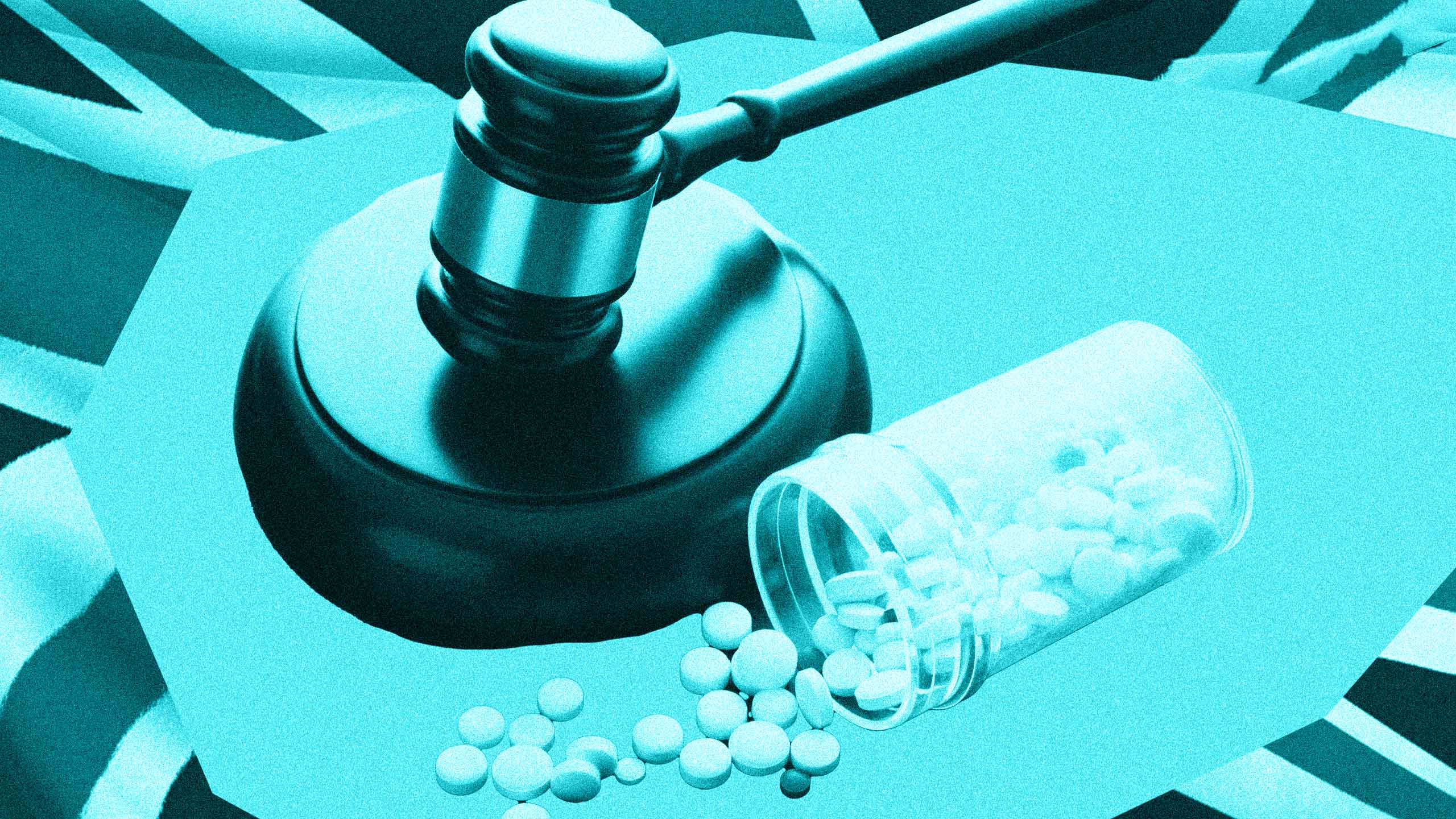After months of scraping together spare testosterone gel from his friends and then securing an unsustainably expensive private prescription, Marc* burst into tears when he finally got his testosterone through the U.K.’s National Health Service (NHS) three years ago. He was 19 years old at the time, and “just so happy that I finally had my own testosterone, that I didn’t have to ask my friends for it,” he tells Xtra. But just a month later, his happiness was crushed when a doctor said they didn’t know how to do the relevant bloodwork to monitor his hormone levels. They refused a refill.
Getting trans healthcare in the U.K. has long required jumping through numerous hoops and languishing on a years-long waiting list—and that’s just for a first appointment at an NHS gender identity clinic. Hormone prescriptions are even more elusive; as a result, it’s not uncommon for trans people to go down the complicated and at times inconsistent routes of ordering online or borrowing from friends.
Securing any kind of hormone prescription requires fighting tooth and nail, becoming a de facto expert in trans healthcare, and relying on support networks to weather the emotional storm of endless anti-trans news and frustrating medical admin. Even after these ordeals, the last few months in particular have seen a concerning rise in the number of trans people being denied hormones. This is nothing new—as Marc’s experience three years ago shows—but over the past several months, many have seen increasing reluctance from doctors to prescribe what can be life-saving medication.
These issues aren’t U.K.-specific. Anti-trans laws in countries like the U.S. and Canada are being churned out at an alarming rate, and lawmakers in these countries are using the same playbook. They’re making vital healthcare more difficult to access, or entirely inaccessible, like with the puberty blocker ban in the U.K., based on the widely discredited Cass Review, a report on the country’s trans healthcare services that is rife with anti-trans misinformation. They’re rewriting laws to erase the existence of trans people; in the U.K., a Supreme Court verdict recently wrote trans women out of long-standing equality legislation, opening the door for future trans rights rollbacks. The Trump administration has been denying trans people changes to their passport gender markers, increasing their risk of harassment or violence while travelling. These attacks are relentless, and mainstream media does little to amplify them, instead publishing fear-mongering, anti-trans coverage, usually with zero input from trans people themselves.
Grassroots organizations are doing the exhausting work of documenting this discrimination. U.K. non-profit TransActual published research last October that described “trans adults [being forced] to detransition” due to doctors denying them healthcare, alongside a call for trans people experiencing these denials to get in touch. So far, they’ve heard from 215 trans adults nationwide—likely a much lower figure than the total number of those impacted.
Other trans-led charities corroborate these claims. National service provider Gendered Intelligence’s communications officer Cleo Madeleine confirms: “The NHS has taken a harder stance on shared care agreements, where they support or share responsibility for private care. This has led to many trans people who have previously used private gender identity services with support from the NHS—for example, with blood tests—losing access to that care.” This shift is devastating for lower-income trans people in particular, who often have to endure financial hardship to get their hormones through private providers.
Madeleine outlines how doctors use the common justification that they “don’t feel confident treating trans patients” to deny hormone prescriptions or gender-affirming care referrals. She’s met a trans woman who went to the doctor with respiratory issues and was turned away, because the GP was “not familiar with her hormone therapy treatments.” Merely taking hormones can be enough for trans people to be denied other, unrelated, care.
In a statement sent to Xtra, the RCGP (Royal College of General Practitioners) echoes this language, describing trans healthcare as a “complex area of medicine,” and acknowledging that RCGP members diverge on the issue. The college claims that GPs “aren’t trained to have the specialist skills required” to treat trans patients, but does not state an intention to improve this training.
This has created a kind of “opt-in” model of trans healthcare, making it dangerously easy for doctors to simply claim a lack of expertise and refuse to treat trans patients. “Some trans people might require specialized care––trans men, for instance, can have a masculine hormone profile but still require gynecological care, like cervical screenings,” explains Madeleine. “But this is care that GPs should be competent and confident prescribing, and it’s certainly not a reason to discontinue prescriptions or refuse to see trans patients.” Those claiming a lack of expertise are, in her eyes, “failing [trans] patients.”
Cameron* first accessed hormones privately in November 2023—at the time, his nearest gender clinic had only just started processing referrals from 2019—and had no problems with NHS prescriptions until March this year, when he received a letter saying the NHS could “no longer offer this additional service because of the lack of expertise and the closure of gender identity clinics.” He had been seeing screenshots of similar letters shared by other trans people in the U.K. on social media and in group chats since late last year, with almost identical wording.
Cameron had long feared his moment would come. “When I started hearing about these letters, I started avoiding going to appointments where I thought I might have to have blood taken,” he tells Xtra. “It got to a point where I was edgy about anything where there might be a suggestion I should come off hormones. I get paralyzed with anxiety when I need my medications refilled, and these are essential medications that stop me having things like seizures. I don’t think people understand how much this affects us seeking out even regular medical care that is in no way related to our transition.”
This anxiety can mean that trans people avoid accessing healthcare altogether. Madeleine cites a 2018 survey, which found that nearly a fifth of trans people avoid going to the doctor, even when they need to, out of fear of being mistreated. She adds that refusal of hormone prescriptions can have significant health consequences, even beyond mental health risks: “Trans people who have had genital reconstructive surgeries or similar procedures don’t produce their own hormones, and without medication can become seriously ill.”
Just as U.S. anti-trans rulings have been fuelled by the U.K., it’s likely this clampdown on trans healthcare will intensify globally. The crackdown on adult care in the U.K. began with a puberty blocker ban, just as Trump’s earliest anti-trans orders barred vital healthcare for trans youth. In both countries, legal attacks have only escalated since.
There are ways to battle this. Along with trans-led groups like Trans Safety Network, there are websites like the U.K. resource Gender Construction Kit, which offers in-depth breakdowns of every aspect of gender-affirming care. Local mutual aid networks exist. Dig hard enough within local communities and one can find trans-led WhatsApp groups and support networks, filled with tips on navigating healthcare systems that feel increasingly like postcode lotteries. Both Marc and Cameron credit their trans friends with helping them find well-informed, trans-friendly doctors in their areas, and many are very willing to share their personal experiences in order to help others navigate the increasingly murky waters of gender-affirming care.
Patients—in any country—can take precautions in medical appointments too. In Unheard, her book about healthcare inequalities and silencing, London-based NHS consultant Dr. Rageshri Dhairyawan presents a few recommendations for trans patients, such as “bringing someone with you to help you advocate and writing down what you want to discuss and get out of the appointment,” as well as “taking notes and asking to be signposted to relevant resources and support groups.” In the U.S., subscription-model digital healthcare providers like FOLX and Plume are built specifically for LGBTQ2S+ people, charging a monthly subscription fee in exchange for access to gender-affirming care, mental healthcare and more. In 2023, FOLX started accepting insurance, a vital step toward making this care more affordable. Despite losing funding last year, the website of the now-defunct Canadian non-profit TransCare+ still has a broad library of key resources and mutual aid networks, which can be similarly life-changing.
Finding other trans people online can be vital not only for building a sense of solidarity, venting frustrations and asking for trans-specific advice—it can be the fuel needed to fight archaic systems. U.K.-based activist network Trans Kids Deserve Better is best known for its ballsy protests and punk advocacy, but it also holds craft socials and nurtures essential friendships among trans youth. The internet has made fostering international solidarity easier than ever; we can use forums to share our experiences and skills, comfort one another as the horrors persist, and even research practical solutions to problems for trans people who are simply too burned out and exhausted to do so themselves.
Healthcare specificities vary from country to country, but so many of us understand what it means to be denied our bodily autonomy by legislators and healthcare professionals. It’s no stretch to say that we literally keep each other alive in times of need. “Globally, we’re really good as trans people at offering support and solidarity,” Cameron says. “I take comfort in knowing that trans people have always been here. They’re not going to get rid of us that easily.”
* Names have been changed for privacy


 Why you can trust Xtra
Why you can trust Xtra


